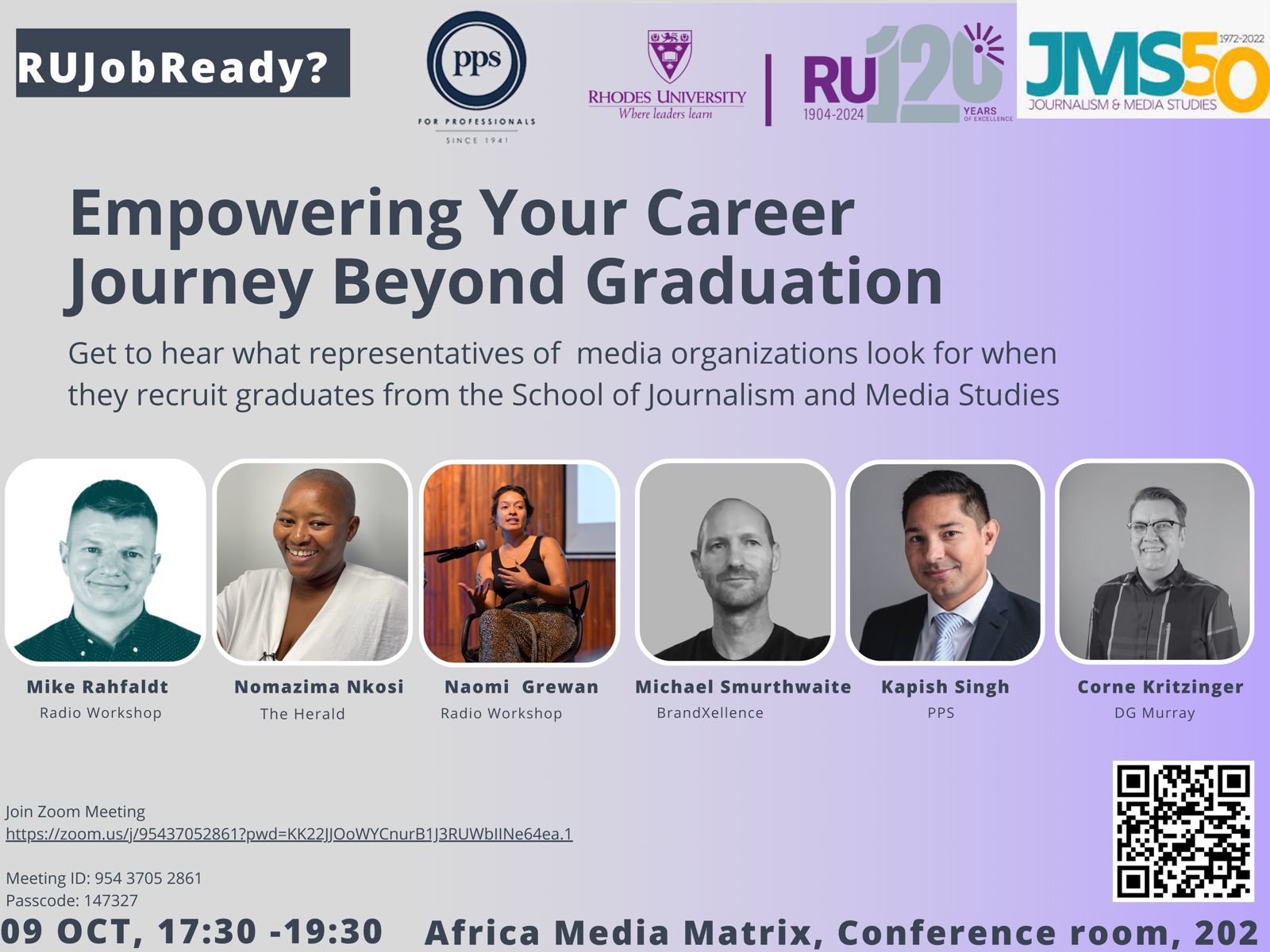By Nothando Yolanda Tshuma
Rhodes University students, Amahle Shosha and Lesego Phale, a part of the Journalism and Media Studies fourth year Audio Class hosted a #RUJobReady seminar to equip students with the right information in preparation of the real world in collaboration with insurance brokers PPS for professionals last week.
The panel consisted of Mike Rahfaldt from Radio Workshop, Investigative Assistant Editor Nomazima Nkosi from The Herald, Kapish Singh from PSS for Professionals and Lastly Corne Kritzinger from DG Murray Trust.

“Twenty percent of young people in Africa live without an employed adult in their home and it paints a picture of the connections that people have to have in the world of work and how to do things correctly. A survey done by Youth Capital, states that, eight in 10 young people feel discouraged from looking for work. Looking at the state of employment in the country and the quarterly survey of 2024 states that 9.6 million young people are not in employment, education or training. There’s a large number of young people who are striking to look for work and are discouraged from doing so,” said Corne.
One of the things that discourage young people from applying for work is the cost of applying for work.
Another survey that was conducted in 2019 found that, on average it cost a job seeker about R1000 a month to look for a job due to the price of transport, CV compilation and design as well as printing.
So how do you fit all of that into your communications back? Generally, a two-page CV or one page CV is sufficient as long as all the information that is needed is there and also one should try and avoid spelling mistakes,
People tend to think that the busier the CV looks, the more impressive it is, however, it is all the experience that matters, every skill or training you have gained through your all the jobs that you have one or even the volunteer jobs that may have given you a valuable skill set.
Few points to note when compiling a CV:
- Use a professional template
- Keep your CV simple and concise make it relevant. Invite the reader’s attention by using open space, wide margins and bullets to set off text.
- Tailor your CV to the job
- Number of your pages
- Organize your heading
- Use clear language, spell and punctuate perfectly.
- Check and recheck your CV before you submit it
How far back do you reference your experiences in a CV? You can include your experiences along the way. It is about making it relevant to the employer. So, you being a prefect in your Primary School or Highschool means that you have really had opportunities to be in a leader position.
Positive mindset is critical.
In life, there are two elements. One is competence and one is skill. You can learn the skills that you are technical to show your competence.
Mr Kapish Singh, Corporate Social Investment Manager from PPS for professionals also gave a presentation on how to prepare for a Job Interview. “Component for me as an employer and a hiring manager is authenticity,” says Singh.
Be Authentic and Prepared: The speaker stresses that it is essential to “be yourself” and not fall for “tricks.” They suggest researching the company and practicing answers to common questions but ultimately remaining authentic.
“All you can do is be authentic, and if you’re prepared well enough, you should get through fine,” says Singh
The STAR Method: This method is recommended to structure responses effectively during interviews. It involves explaining a Situation, identifying the Task, detailing the Action taken, and explaining the Results. The focus should be on showcasing personal skills and traits:
First Impressions Matter: The importance of a strong start is highlighted with advice such as a firm handshake, eye contact, and appropriate attire.
“First impressions last. You know, have a firm handshake, make eye contact,” says Singh.
SMART Goals: The SMART framework is explained to help set realistic and measurable career goals. Singh emphasized having goals that are Specific, Measurable, Achievable, Realistic, and Time-bound.
“It must be achievable… it must be realistic, and you must be able to put it down in a time frame,” said Singh.
CORE Acronym: They mention CORE, which stands for Communication, Organization, Respect, and Ethics. These are key qualities to have in the workplace, with a particular focus on ethics.
“Ethics in the workplace is critical,” said Singh.
Posture and Listening: Lastly, Singh noted that posture can impact interview results, as well as listening carefully to questions before answering.
“Make sure you listen…don’t feel like you need to rush in to answer,” said Singh.

